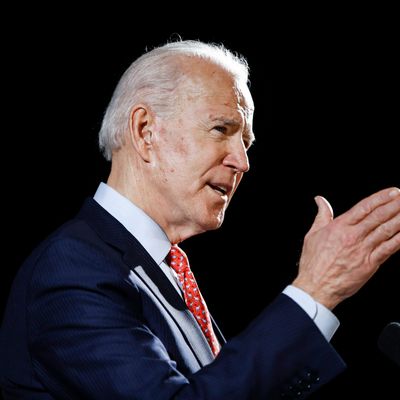
The fact that Joe Biden has just announced new policy proposals on access to health care and student-loan relief should come as zero surprise. As Greg Sargent points out, Biden is understandably absorbed with making multiple unity gestures toward supporters of Bernie Sanders immediately following his rival’s withdrawal from the race:
Now that Joe Biden is the de facto Democratic nominee, the question is: Can he mend fences with Bernie Sanders’ movement, or at least with a very sizable percentage of his voters?
The Biden campaign is now set to roll out its first major down payment on this effort, by announcing two new policy proposals that go farther than he had during the campaign. They may not go as far as Sanders would, but they’re still a striking move in his direction.
If anything, Sargent may be overestimating the extent to which these initiatives break new ground. On student loan debt, Biden is proposing to “forgive all student debt for low- and middle-income borrowers who attended public colleges or private Historically Black Colleges and Universities (HBCUs) and private, underfunded Minority-Serving Institutions (MSIs).” That’s a means-tested, targeted approach to a problem that Sanders and many other progressives consider universal and worthy of universal and prospective relief.
Biden is arguably moving even more deliberately on an issue that is absolutely essential to Sanders’s “revolution” and central to the crisis being generated by the coronavirus pandemic: health care.
In a well-timed essay today, Ezra Klein explained why current circumstances make Biden’s existing health-care proposal, based on adding a public option to Obamacare without disturbing employer-based insurance coverage, completely inadequate:
[D]isruptive change is here, whether anyone wants it or not. It won’t just be felt in the rising ranks of the uninsured, in the millions of people who lose the insurance provided by their workplace and have to scramble, desperately, for an alternative. It will also be felt by those who keep their job-based insurance, only to see it degrade as their employer rushes to cut costs …
Large employers are not allowed to buy into the new public option. Individuals can’t use the money their employer is spending on private health insurance to buy into the public option. What they’ve built isn’t a glide path to Medicare-for-all, or even to a new hybrid system. Instead, they’ve created a backstop to reinforce the current system, with all its flaws. And over the next year, the coronavirus is going to make those flaws gruesomely apparent.
Klein argues that Biden ought to adopt something like the Center for American Progress’s Medicare Extra proposal, which doesn’t abolish private insurance like Medicare for All but does allow both employers and employees to buy into a subsidized public program that adds a number of important protections to Medicare (and that would subsume the existing Medicaid and Obamacare programs). Medicare Extra also seeks to extend the federal government’s medical price-setting mechanisms into private insurance (i.e., all-payer rate-setting).
Biden’s announced new position today as described by Sargent doesn’t go remotely as far:
The first proposal is to lower the eligibility age for Medicare to 60, from its current 65 …
The Biden campaign’s idea is that this would make Medicare available to two groups: Those who work and retire before they turn 65, or those who are 60 and above who want to leave employer plans or other plans they access through the Affordable Care Act before they retire.
Like his original plan to offer a public option to the uninsured, Biden’s revised plan doesn’t do much for those whose employer-based insurance loses much of its value via higher premiums, co-pays, deductibles, and coverage restrictions — which, as Klein notes, is about to become a gigantic problem. The new initiative “reflects a particular reading of what our post-coronavirus crisis will look like, one in which ‘older Americans are likely to find it harder to secure jobs,’” according to Sargent.
Perhaps the best thing about Biden’s gesture is that it sounds exactly like that — a gesture, not a permanent position. He can expand both his student loan forgiveness and health-care proposals further without any major philosophical shifts. As Klein makes clear, there is particularly a lot of ground left between Biden’s revised health-care proposal and M4A. And because we are in a national economic and health-care crisis for the immediate future, nobody’s going to find too much fault with Biden for making adjustments. Indeed, he might want to do so daily to dramatize the stunning fact that the Trump administration still has no plan for expanding or protecting health-care coverage even as it continues to support the repeal of Obamacare.






























